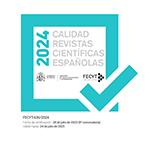Descartes, Freud and Lacan: the passage to the act and the nightmare
Abstract
Starting from the Lacanian notion of passage to the act the process of doubt and the key moments of its overcoming are interpreted in terms of a passage to the human act that will give rise to the cogito and a divine act that will give rise to the immutable order of the eternal truths. In this way, the paper tries to explain the way in which Descartes constitutes the fantasmatic framework of science. Although the reference text to monitor the process of doubt is Metaphysical Meditations, it is indicated how in this process the echo of a decisive dream experience that Descartes had at the age of 23 is recognizable, an experience that helps to understand as much the impact of anguish behind the Cartesian metaphysical turn as the pre-subjective reverse from which the awakening to self-awareness that takes place in the cogito emerges. The preferred path used in the interpretation carried out is that of psychoanalysis as developed by Lacan.
Downloads
Article download
License
In order to support the global exchange of knowledge, the journal Logos. Anales del Seminario de Metafísica is allowing unrestricted access to its content as from its publication in this electronic edition, and as such it is an open-access journal. The originals published in this journal are the property of the Complutense University of Madrid and any reproduction thereof in full or in part must cite the source. All content is distributed under a Creative Commons Attribution 4.0 use and distribution licence (CC BY 4.0). This circumstance must be expressly stated in these terms where necessary. You can view the summary and the complete legal text of the licence.











